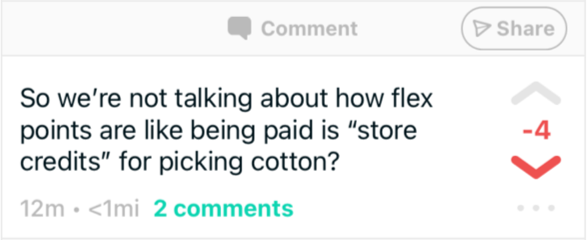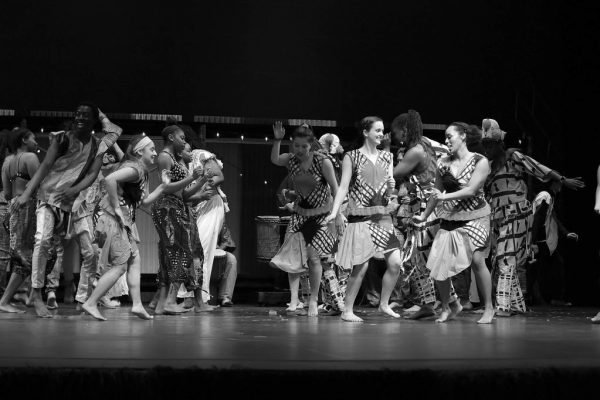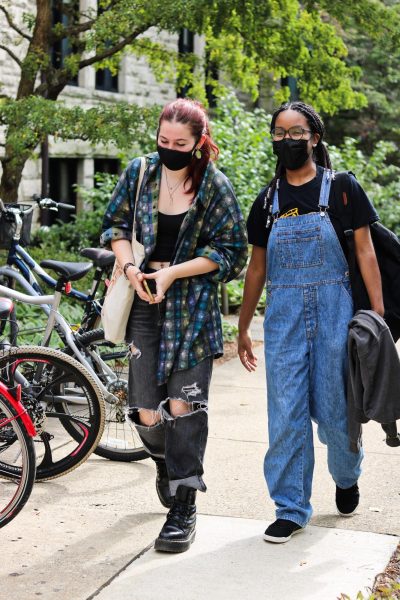Racism and Assault Allegations: Ugly Side of Oberlin Yik Yak

Editor’s note: This article discusses anti-Black racism and sexual assault.
As a first-year at Oberlin, I’ve learned that there are a lot of things that aren’t explained at Orientation. I’ve learned where to find the womb chairs in Mudd Center and how to jaywalk between Wilder Hall and the Science Center without getting hit by a car. I’ve also learned about Yik Yak, a popular app where you can make anonymous confessions that are only visible to people within a five-mile radius. I’ve seen humorous posts about topics that are quintessentially Oberlin: long lines at Stevenson Dining Hall, the elusive albino squirrel, and things that are probably best kept between friends. However, I have also noticed some more disturbing trends: posts making students of color uncomfortable, severe anti-Black racism, and posts exposing sexual abusers.
One such incident on Yik Yak involved white students complaining about being uncomfortable while walking through Afrikan Heritage House to get to Lord-Saunders Dining Hall. The Afrikan Heritage House is a living space and community for students who are part of the African Diaspora, and it’s worth noting that the main entrance to Lord-Saunders Dining Hall does not require anyone to pass through the dorms. When Black students expressed their own discomfort with the posts on Yik Yak, non-Black students were quick to mock and harass them in the comments.
While all posts related to this incident were downvoted, deleted, and unable to be screenshotted, I was able to get a screenshot of another concerning post. In this post, the user wrote, “So we’re not talking about how flex points are like being paid ‘store credits’ for picking cotton?” comparing the controversial Oberlin meal plan to chattel slavery.
In less extreme cases, I’ve seen students of color voice their frustrations about being talked over by white peers or experiencing microaggressions; yet, far too often, there are comments talking down to them and their experiences.
To be completely honest, I wasn’t very surprised to see this happening. I knew that Oberlin, as a predominantly white institution, would have these issues despite building its brand and reputation on being “inclusive” and “accepting.” Furthermore, as a person of color, I already knew that there are plenty of white “allies” who will say one thing to your face and another behind your back. It was comforting to know that the majority of the Oberlin community did not agree with these messages, with users quick to call out and downvote the people who made racist posts. Despite this, it’s still incredibly unsettling that people feel comfortable making these statements in the first place. Yik Yak gives people the ability to be anonymous and say whatever bigoted statements they would like with absolutely no consequences.
In addition to perpetuating racism on campus, people have also been using Yik Yak to call out sexual predators, specifically on the men’s athletic teams, and have used full names and social media handles to warn others. Most of these posts get taken down because Yik Yak does not allow posts with full names, but this does not deter people from continuing to discuss rape culture at Oberlin. While people post names with good intentions, this harms survivors emotionally.
Emma Hart, College third-year and founder and leader of Survivors of Sexual Harm and Allies, emphasized that conversations centering sexual harm survivors need to be held, but she also acknowledged the complexity of using social media to make allegations.
“When posting on social media, speak from your own experience,” said Hart. “When other people take [a survivor’s story] to debate or use as a form of gossip, … it’s retraumatizing for a survivor.”
Though I understand that there are laws, privacy issues, and regulations involved, learning about these sexual assault allegations from Yik Yak has been disturbing. It’s barely been a full month since I’ve been here, but because of these posts, I’m already having doubts about how well Oberlin truly supports victims of sexual assault.
With that said, it is important to acknowledge that the College has taken some steps to combat the issue; all first-years are required to take a training about consent, and there are resources on campus for survivors, such as the College’s Preventing and Responding to Sexual Misconduct program and student-led SOSHA.
Despite the frequency of these incidents, I hesitated to write this article for a number of reasons. First, it’s hard to find the culprits because all Yik Yak posts are anonymous. There is a very real possibility that someone who doesn’t attend the College but lives around the area is launching racist attacks to get a reaction out of people. Additionally, I highly doubt that this one article will stop the barrage of anti-Black racism at Oberlin.
Regardless, this is an issue affecting our community as a whole, and if we want to create a safe environment for marginalized students, we can’t just downvote these posts, comment a snarky comeback, and call it a day.
Hart and I talked about further action steps, specifically about conversations regarding sexual harassment. For the men’s athletics teams, a group specifically mentioned on Yik Yak, she stated that they need to “accept responsibility … and apologize [to survivors] rather than to immediately center their image.”
SOSHA is also using the momentum from Yik Yak allegations to work on bringing awareness to sexual harassment on campus. They hosted an open forum on Oct. 28, and they are planning to bring an action list to the Oberlin administration. At the beginning of the school year, SOSHA also wrote a letter in the Student Labor Action Coalition’s Disorientation zine discussing sexual harassment on Oberlin’s campus.
While the anti-Blackness on Yik Yak and the posts of sexual assault allegations are not comparable situations, they speak to a concerning pattern of social media usage at Oberlin, as well as an overall troubling culture. There is still a lot of work to be done as Oberlin continues to grapple with these posts, but I hope that this article and SOSHA’s advocacy will increase awareness of these issues in the Oberlin community.
Below is a non-exhaustive list of resources available for students on campus.
SOSHA is an advocacy organization that provides support for survivors of sexual assault. If you need to talk or if you wish to join their contact list, email [email protected]. They regularly post updates on Instagram @oberlin_sosha.
PRSM is an organization under the Title IX office dedicated to responding to sexual assault and educating the Oberlin community about topics regarding sexual assault prevention. Email them at [email protected]
The Multicultural Resource Center provides support for students of color, LGBTQ+ students, and first-generation students. Email them at [email protected]. They are on Instagram as @obiemrc.




